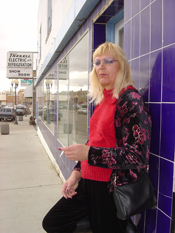 |
||||
Still fromCruel and Unusual |
||||
Journal Issue 2.2
Fall 2010
Edited by Agatha Beins, Deanna Utroske, Julie Ann Salthouse, Jillian Hernandez, and
Karen Alexander
Editorial Assistant: Julie Chatzinoff
Toilet Training. Directed by Tara Mateik. New York: Sylvia Rivera Law Project, 2003.
Cruel and Unusual. Directed by Janet Baus, Dan Hunt, and Reid Williams. New York: Outcast Films, 2006.
Reviewed byToby Beauchamp
Toilet Training considers a topic that attorney and activist Dean Spade describes in the film as “fundamentally under-discussed in our culture”: the ways that bathrooms become normalizing sites of gendered scrutiny and violence. The documentary uses personal narratives, legal cases, and examples from popular culture to explain the complexity of regulatory gender norms in the everyday space of the bathroom. Examining bathrooms in schools, workplaces, and public space, Toilet Training features analysis from educators and activists including Spade, Amber Hollibaugh, and Eli Clare, as well as a variety of narratives demonstrating the pervasive policing of those bodies perceived to be in the wrong bathroom. Throughout, it emphasizes that this scrutiny is exacerbated for bodies also marginalized along lines of race, class, ability, age, and citizenship. The film discusses, for example, the ways that transgender-identified women of color are particularly vulnerable to police harassment in public restrooms and the ways that bathroom access is key to both transgender- and disability-rights struggles.
Importantly, Toilet Training moves beyond a “transgender 101” lesson, referencing broader political concerns about violence, intersectionality, public and private space, and state regulation of bodies. More advanced classes will therefore find it a valuable case study through which to engage key feminist theoretical debates. For instance, the film takes up questions of safety in women-only spaces, challenging the notion that bathrooms marked as such are necessarily safe, and pointing out that many communities – not just transgender-identified people – might benefit from single-stall restrooms. At the same time, the film is an inviting text for more introductory classes; precisely because its analysis is not limited to transgender-identified people, Toilet Training demonstrates the effects of regulatory norms on all gendered bodies.
An online companion guide offers information on U.S. antidiscrimination policies, suggested classroom discussion questions and activities, and activist resources.1 The film would also pair well with Leslie Feinberg’s classic novel Stone Butch Blues.2 Toilet Training need not be taught simply as part of a transgender studies unit, but would be useful for units addressing public and private space, gendered violence, or the role of the state in feminist movements.
Cruel and Unusual examines the cases of five transgender women incarcerated in men’s prisons. Explaining that transgender people are incarcerated at a rate three times the U.S. national average and that almost all prison housing policies rely on genitals rather than gender identity, this documentary offers an unflinching look at the emotional, physical, and sexual violence aimed at transgender people in prison. The film covers topics including access to transgender-specific healthcare and hormones, the routine placement of transgender prisoners in solitary confinement, and violence at the hands of guards and other inmates, providing statistics and legal information along with compelling narratives from the women themselves and commentary from attorneys and mental health professionals.
Cruel and Unusual is clear and straightforward in format, but its content is complex and powerful. It would enrich both introductory and advanced classes, but in either case teachers should prepare for intense emotional responses the film may provoke, particularly given discussions of sexual assault and suicide attempts. Relatedly, visual documentation of one woman’s genitals may need to be handled with care, and readings addressing public and medical scrutiny of “abnormal” genitals may be valuable here.3 On the whole the film avoids sensationalizing the women’s narratives, using their stories to propel an incisive critique of the structure of prisons in the United States.
This film is particularly strong when it expands its analysis beyond individual interviewees, as when it reminds us that transphobia on a structural level – employment and housing discrimination, or the failure of many homeless shelters to provide safe space for transgender-identified people – creates conditions under which certain populations are easily criminalized. Similarly, the lawsuits two of the women file against state corrections departments are importantly marked as having political effects exceeding these individual cases. The film focuses primarily on prison reform, and teachers may find it helpful to assign texts critiquing the prison system itself, or analysis from activist organizations such as the TGI Justice Project or Incite! Women of Color Against Violence.4 Outcast Films also offers an online “study guide” created by Human Rights Watch, which begins to move beyond U.S. contexts.5
Toby Beauchamp (tbeauchamp@ucsd.edu) earned his PhD in Cultural Studies from the University of California at Davis. He is currently a postdoctoral fellow in Communication at the University of California, San Diego, where he is working on a book project about transgender politics and U.S. surveillance practices.
1 See the Toilet Training Toolkit at http://srlp.org/films/toolkit.
2 Leslie Feinberg, Stone Butch Blues: A Novel (Ithaca, NY: Firebrand Books, 1993).
3 See, for example: Anne Fausto-Sterling, “Gender, Race, and Nation: The Comparative Anatomy of ‘Hottentot’ Women in Europe, 1815-1817,” in Deviant Bodies: Critical Perspectives on Difference in Science and Popular Culture, eds. Jennifer Terry and Jacqueline Urla (Bloomington: University of Indiana Press, 1995), 19-48; Siobhan Somerville, “Scientific Racism and the Invention of the Homosexual Body,” in Queering the Color Line: Race and the Invention of Homosexuality in American Culture (Durham: Duke University Press, 2000), 15-38; and Jennifer Terry, An American Obsession: Science, Medicine, and Homosexuality in Modern Society (Chicago: University of Chicago Press, 1999).
4 For information on the TGI Justice Project, see http://tgijp.org/wordpress/. For Incite! Women of Color Against Violence, see http://www.incite-national.org/.
Copyright © 2014. All rights reserved.